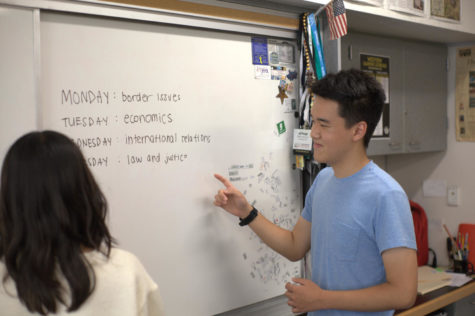Wang creates political science camp
August 26, 2022
For five days in a row, Aiken Wang (12) started his morning at 8:00 a.m., checking in and taking attendance for his San Diego political science summer youth program, which ran from Aug. 1-5, instructing incoming seventh graders to seniors for six hours a day.
“Most teachers would arrive forty-minutes or so earlier to prep,” Wang said. “This would entail moving around chairs, checking online homework submissions, replying to emails, etc. As students would walk in, we’d start preparing for mock debates.”
According to Wang, opportunities for high schoolers to be involved in politics are limited. Wang says that although there are other ways to be involved in political science, like Model UN and Speech and Debate, there was less of a chance to do networking with people trying to make a difference.
In organizing the political science camp, Wang said he was trying to offer hands-on opportunities to supplement traditional classroom learning.
“We’re trying to facilitate interactions between government officials, civil society and academia with students to hopefully give them a chance to explore and get interested,” Wang said. “We want to show them what kind of career options are available and what research looks like.”
For example, they brought in former U.S. Treasury official Richard Feinberg to lecture on economic policy. They also brought in, Assistant U.S. Attorney Cindy Cipriani of the Department of Justice who talked in detail about the justice system. Each guest speaker explained how they came to work in their occupation now, and shared what it’s like to work in their field.
The planning process started in May when Wang and several other members from the Speech and Debate club started reaching out to professionals in various fields of political science and college professors regarding their availability for volunteering to guest speak at the camp.
“It was really just a process of sending out a ton of emails and then hopefully someone replies and then we could coordinate their schedules,” Wang said. “That was probably the most complicated process.
On top of reaching out to guest speakers and asking if they could volunteer their time, Wang said the teachers also had to create their own lessons.
“We had to present our own educational materials, like lectures, PowerPoints, projects, assignments, stuff like that,” Wang said. “It took some time to do that. Plus, each teacher makes and shows their own lectures.”

Co-teacher Phoebe Vo (10) said that because political science covers many topics, the student-instructors were able to pick which subject they’d prefer to teach.
Vo is interested in being a lawyer so she chose to teach law. She said setting up lesson plans was an easy process.
But Vo didn’t want the students to be lectured the entire time, so she came up with fun activities to keep them engaged, one being pretending the students were criminals and taking them through the process of the criminal justice system.
“We set up the classroom like a courtroom, and had them choose a crime where they had to stand there and act out the scenarios,” Vo said. “I hoped it’d be more interactive and fun for them.”
Other than that, lessons were normally a preface of what the guest speakers went over that day.
“I wanted to give them more of the basics of law because [the guest speakers] didn’t really cover those things yet,” Vo said. “It was basically a rundown of the government.”
Since Vo’s lesson was focused on law, she focused on the judicial branch and the system of courts there and gave examples of past cases.
“We just explained like how you can appeal to higher courts and everything,” Vo said. “That’s how we started [the students] off as a criminal in the lowest court, and have them keep appealing to higher courts. We also used example cases, a lower level,, a mid level, and even one from the Supreme Court to talk over and explain.”
Kendall Ratcliff (9), who attended the political science camp, said that the camp helped her learn more about political science and that the lessons shown really intrigued her.
“The international relations piece of the discussion especially interested me, and I was glad to see it well represented in the camp’s itinerary,” Ratcliff said. “I was amazed at the list of qualified people who were scheduled to guest lecture for us, and I’m happy that the students running it built a professional and enriching camp for curious students. I have no doubt that the clubs that ran this camp will continue to do great things, and I’m excited to see what they do next.”
As a senior, Wang said he hopes that this camp will continue on after he leaves Westview.
“We definitely have plans to continue this, ” Wang said. “It’s probably going to look a little different year by year, but I think this is definitely a tradition that we started this year and I think has the potential to go on for some time.”

